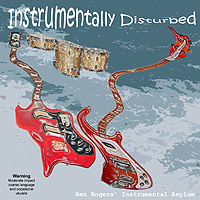 Guitarist
Ben Rogers is the boss of Australian instrumental surf-rock. Backed
up by his group Ben Rogers' Instrumental Asylum, Ben has really been
on a roll thanks to several key releases, including the 2007 release
of Reverb Rehab. Backed up by the same band of players on that
album—Nikki Scarlett (bass, ukulele) and Denis Close
(drums, rhythm guitar, sound effects)—Ben now presents a
great follow-up with 2010’s Instrumentally Disturbed.
Ben Rogers records the same type of surf-music that Jimi Hendrix
would have liked—plenty of hard rock riffing, enough echo to
fill a stadium and the tracks to make it all click. Ben really comes
into his own as a composer on the humorously titled Instrumentally
Disturbed CD. Even so, for this writer the two highlights here
are a pair of cover tracks that project just how original and bold
Rogers can get as a guitar stylist. Back in 1962, the all girl group
The Exciters had a huge pop smash with “Tell Him”—produced
by Lieber and Stoller—that brought them to the top ten of the
music charts. In the process, Rogers and his Asylum have transformed
what was a national girl group hit in ‘62 into a raging instro-rock
classic. It's just amazing stuff really. Also, one of the all time
classic songs, “Beyond The Sea” is given a new twist on
Ben’s take of the track with the original 1943 French title,
“La Mer”. Even though “Beyond The Sea” has been
recorded by 400 artists at least, Ben really puts a cool instro spin
on this timeless classic. Looking for a comforting musical sanitarium
where instrumental rock inosculates with surf and retro rock? Welcome
to Ben Rogers' Instrumental Asylum. www.BenRogers.com.au
/ www.Blazz.com.au
Guitarist
Ben Rogers is the boss of Australian instrumental surf-rock. Backed
up by his group Ben Rogers' Instrumental Asylum, Ben has really been
on a roll thanks to several key releases, including the 2007 release
of Reverb Rehab. Backed up by the same band of players on that
album—Nikki Scarlett (bass, ukulele) and Denis Close
(drums, rhythm guitar, sound effects)—Ben now presents a
great follow-up with 2010’s Instrumentally Disturbed.
Ben Rogers records the same type of surf-music that Jimi Hendrix
would have liked—plenty of hard rock riffing, enough echo to
fill a stadium and the tracks to make it all click. Ben really comes
into his own as a composer on the humorously titled Instrumentally
Disturbed CD. Even so, for this writer the two highlights here
are a pair of cover tracks that project just how original and bold
Rogers can get as a guitar stylist. Back in 1962, the all girl group
The Exciters had a huge pop smash with “Tell Him”—produced
by Lieber and Stoller—that brought them to the top ten of the
music charts. In the process, Rogers and his Asylum have transformed
what was a national girl group hit in ‘62 into a raging instro-rock
classic. It's just amazing stuff really. Also, one of the all time
classic songs, “Beyond The Sea” is given a new twist on
Ben’s take of the track with the original 1943 French title,
“La Mer”. Even though “Beyond The Sea” has been
recorded by 400 artists at least, Ben really puts a cool instro spin
on this timeless classic. Looking for a comforting musical sanitarium
where instrumental rock inosculates with surf and retro rock? Welcome
to Ben Rogers' Instrumental Asylum. www.BenRogers.com.au
/ www.Blazz.com.au
MWE3.COM PRESENTS AN INTERVIEW WITH
BEN ROGERS' INSTRUMENTAL ASYLUM
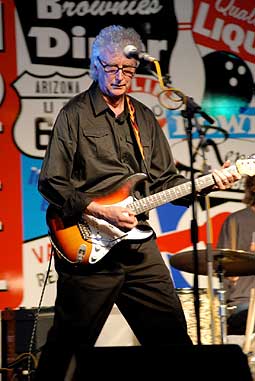 mwe3.com:
The new album Ben Rogers' Instrumental Asylum, Instrumentally Disturbed
is a fantastic instrumental rock guitar album. How would you compare
the approach and end results on the new 2010 album compared to your
2007 album, Reverb Rehab?
mwe3.com:
The new album Ben Rogers' Instrumental Asylum, Instrumentally Disturbed
is a fantastic instrumental rock guitar album. How would you compare
the approach and end results on the new 2010 album compared to your
2007 album, Reverb Rehab?
Ben Rogers: Thanks Robert - I'm pleased you like it! Although we were
very happy with Reverb Rehab and quite flattered by the reviews,
our approach was to "raise the bar" with the new album.
The approach to recording Instrumentally Disturbed was similar
to Reverb Rehab - some tracks were recorded live in our studio
without overdubs, while with others we focused on getting the rhythm
section down and then overdubbed guitars later. Denis had more involvement
in engineering the recording of the drums this time, and we spent
longer on mixing. I think this shows in the end result, and also I
think we're developing our sound as a band. There's more original
material on this album too - only three of the tracks are covers.
mwe3.com: How would you describe the musical chemistry between drummer
Denis Close and bass player Nikki Scarlett and how does Al Kash fit
into the equation?
Ben: There's a great musical chemistry between Nikki and Denis - the
way they feel the "pulse" in the same way provides a solid
bed, so I can just enjoy playing the guitar without needing to think
about holding down the tempo or driving the rhythm - it's just there!
It's similar with Al Kash too, although he's a very different drummer
from Denis - there's a real chemistry when Al and Nikki play together.
Nikki Scarlett: Although Al's style is quite different from Denis,
they both sit in the same place on the beat.
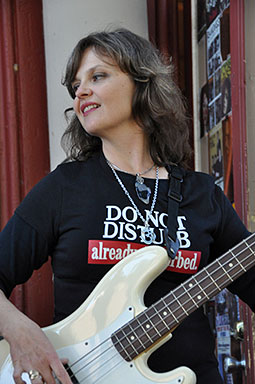 Ben:
Al and I played and recorded together in Perth (Western Australia)
many years ago, before Al relocated back to the US. We've kept in
touch over the years, and Nikki and I have traveled to the US a couple
of times to play some shows together with Al. In 2008 Al was back
in Australia briefly, and we took the opportunity then to record two
tracks with him for Instrumentally Disturbed.
Ben:
Al and I played and recorded together in Perth (Western Australia)
many years ago, before Al relocated back to the US. We've kept in
touch over the years, and Nikki and I have traveled to the US a couple
of times to play some shows together with Al. In 2008 Al was back
in Australia briefly, and we took the opportunity then to record two
tracks with him for Instrumentally Disturbed.
mwe3.com: On Reverb Rehab you blended in some choice cover
tunes including the Beatles' classic "Strawberry Fields Forever"
and on Instrumentally Disturbed I was amazed at your good taste
in that you selected an old girl group number "Tell Him"
to play as an instrumental. How did you end up choosing that song?
I remember buying the 45 rpm single (on Laurie Records? no picture
sleeve) back in 1962 or early '63? What about that song and what do
you look for in a cover track? Was it big in Australia? And are there
other songs stand out as possible future covers to record?
Nikki: There's no particular rhyme or reason with choice of material,
other than one of us just liking a song. For example, the opening
track on Reverb Rehab - “Mr P.C.” - was suggested
by Denis. I'd always liked “Mr P.C.” - it's a fabulous tune
written by a jazz giant, John Coltrane, in honor of one of my bass
heroes, Paul Chambers. At first Ben wasn't sure how to make it work
as a guitar instrumental, but when we started playing it, it just
took on a life of its own.
Ben: If one of us likes a song we'll just try it as an instrumental.
They don't all work out, for example I really wanted to do a version
of Neil Young's "Shock & Awe", but when we tried it,
it just sounded like the song without the vocals! "Tell Him"
was a hit in Australia, and I've always liked it. It's a well-constructed
tune with three sections, and when we played it faster and "garage
style" it just seemed to work. As far as future covers, we don't
have anything in particular lined up, but nothing is sacred!
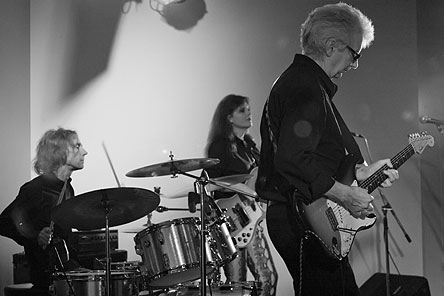 mwe3.com:
Your version for "La Mer" is quite majestic and unusual.
Most people know that song "Beyond The Sea" as a vocal...it's
also slightly derivative of "Perfidia" no? Anyway your version
is quite unique and special. Why and what about that song really stands
out for you?
mwe3.com:
Your version for "La Mer" is quite majestic and unusual.
Most people know that song "Beyond The Sea" as a vocal...it's
also slightly derivative of "Perfidia" no? Anyway your version
is quite unique and special. Why and what about that song really stands
out for you?
Ben: I'm glad you like our version. Once again it's a strong melody,
with a common chord progression somewhat similar to “Perfidia”,
as you say. However it's a deceptive tune, as the melody moves through
three keys, making it quite interesting to play. I first heard the
song as Bobby Darin's "Beyond The Sea", but it was a 1949
version by Django Reinhardt that really endeared the song to me. Of
course our version is nothing like Django's though we've slowed it
down and dirtied it up a bit.
mwe3.com: What songs stand out as favorites of yours on the new CD?
Denis Close: The first track - "Fencing". It's fun to paint
an aural picture, and that's what this tune is to me.
Ben: I think my favorite is "Fencing" too. This track had
a difficult birth. It was one of those tunes that took a while to
evolve, but we worked at it for quite a while to get it sounding right,
and we're really happy with the end result.
Nikki: My favorite is "Blues on a Borrowed Guitar". I'm
a simple soul and like the big ballsy blues sound of this track!
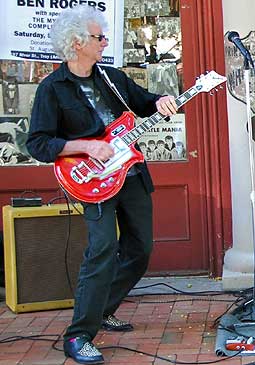 mwe3.com:
You cite the "guitar noir" sound as a big influence. How
would you describe the concept of "guitar noir" and its
practitioners and how does it fit into the Ben Rogers Instrumental
Asylum guitar instro sound?
mwe3.com:
You cite the "guitar noir" sound as a big influence. How
would you describe the concept of "guitar noir" and its
practitioners and how does it fit into the Ben Rogers Instrumental
Asylum guitar instro sound?
Ben: Guitar noir is a term borrowed and adapted from cinema - the
dramatic mood of the classic film noir concept, with lots of dark
unexplored corners and melodramatic crime themes. As far as describing
our sound, we didn't set out to create a particular band sound, and
so we weren't sure how to describe it initially. In some cases we've
used descriptions that others have applied to our music, for example
"like Hank Marvin on acid!". We used the term "surf
guitar" because that's a reasonably well understood category,
but we never intended to recreate the classic surf sound, which is
based on a clean (i.e. - not overdriven) guitar usually played through
a Fender Reverb Tank, with a second guitar or keyboards in the band
to fill out the sound. Our guitar sound is more distorted than true
surf guitar.
mwe3.com: Current Atlantics guitarist Martin Cilia plays on the new
album. How would you describe Martin's contribution on the new album
as well as his influence on the current guitar scene. Also, how big
an influence were The Atlantics on you and the whole Australian guitar
scene back in the '60s?
Ben: The Atlantics' tune “Bombora” was a No.1 hit in Australia,
and as I had taken up the guitar a year or so before it was released
it was naturally an influence on me. Another significant influence
for me was Dave Bridge, the first guitarist I ever saw live in concert.
He had several hits in Australia, including "The Swan",
which he adapted from Tchaikovsky's Swan Lake ballet. We covered one
of Dave Bridge's tunes, "Bondi Stomp" on our last album.
The Denvermen were another early 60s Aussie group that had a hit with
an instrumental - their tune "Surfside" made it to No. 1.
Other US hits such as "Pipeline" and "Wipeout"
as well as the hits of The Shadows and The Ventures, were part of
every budding guitarist's repertoire at the time. We met Martin Cilia
a couple of years ago at an instrumental guitar festival, and got
together for a jam shortly afterwards. We found our playing complemented
each other's and we thought it would be nice for Martin to feature
on a couple of tracks on the album. He's a great exponent of the true
surf guitar style, and brings another layer to the sound of Instrumental
Asylum.
 mwe3.com:
How would you compare the influences of Django Reinhardt, Les Paul
and Hank Marvin on your own playing?
mwe3.com:
How would you compare the influences of Django Reinhardt, Les Paul
and Hank Marvin on your own playing?
Ben: I was somewhat isolated from a lot of music in my youth, living
out in the country and relying on popular radio or my older brother's
record collection which was mostly The Ventures. Chronologically Hank
was an early influence, as The Shadows were very popular in Australia.
I didn't discover Django until much later, nor did I hear anything
of Les Paul during my formative years. However when I did hear and
begin to appreciate Django I spent a number of years immersing myself
in his music to the exclusion of most other styles, and this has influenced
my playing. I still play the Gypsy Jazz style as a side project with
a violinist and with Nikki on double bass.
mwe3.com: Can you let the readers know what guitars and pedals you're
using on the Instrumentally Disturbed CD? Any current favorite
guitars and/or new/vintage gear and the current strings you'd like
to discuss or mention?
 Ben:
While the last album was primarily Fender Strat sounds, Instrumentally
Disturbed features a recent acquisition - a Gibson Johnny A. This
is a small hollow body with ‘57 style humbuckers and a Bigsby
tremolo, and is a very versatile guitar with a beautiful rich tone.
It produces a big sound, especially through my Mesa Boogie (an 80s
Series III Simul-class) on overdrive setting. This is most evident
on the track "Anouman", which incidentally is an arrangement
of a Django composition. I rely on the Mesa Boogie for overdrive,
and run a line out from this through a Boss Giga-Delay pedal into
a 1961 Fender Vibrolux. I don't use any other pedals. The Strat sound
still features on some tracks. I have a couple of reissues - a Fender
Custom Shop 1960 NOS and a 1962 reissue made in the late ‘80s.
For one track - "Shfuffle" - I was aiming for that big Duane
Eddy sound, and for this I used my 1963 Guild Thunderbird.
Ben:
While the last album was primarily Fender Strat sounds, Instrumentally
Disturbed features a recent acquisition - a Gibson Johnny A. This
is a small hollow body with ‘57 style humbuckers and a Bigsby
tremolo, and is a very versatile guitar with a beautiful rich tone.
It produces a big sound, especially through my Mesa Boogie (an 80s
Series III Simul-class) on overdrive setting. This is most evident
on the track "Anouman", which incidentally is an arrangement
of a Django composition. I rely on the Mesa Boogie for overdrive,
and run a line out from this through a Boss Giga-Delay pedal into
a 1961 Fender Vibrolux. I don't use any other pedals. The Strat sound
still features on some tracks. I have a couple of reissues - a Fender
Custom Shop 1960 NOS and a 1962 reissue made in the late ‘80s.
For one track - "Shfuffle" - I was aiming for that big Duane
Eddy sound, and for this I used my 1963 Guild Thunderbird.
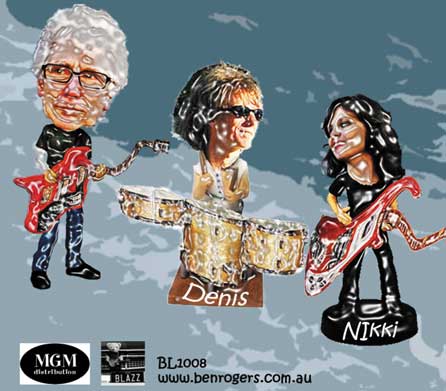 mwe3.com:
Can you say something about what guitarists and instrumental groups
and/or rock and pop albums, artists and singers you're currently listening
to?
mwe3.com:
Can you say something about what guitarists and instrumental groups
and/or rock and pop albums, artists and singers you're currently listening
to?
Denis: Currently listening to Dom Mariani and the Majestic Kelp (from
Perth, Western Australia), and The Aqua Velvets.
Ben: Not a lot of current releases, although out of curiosity I had
to check out Santana's "Guitar Heaven" to see what he'd
done with some of the classic rock standards. Acts that I've seen
live recently include Jeff Beck, The Break, and Don Walker and the
Suave F**ks. I bought Yawning Man's Rock Formations a while
back, and I still enjoy that album, especially in the car on a long
drive. Other favorites include JJ Cale and Danny Gatton, but I still
listen to Django more than any other guitarist.
Nikki: My long time favorites would be Richard Thompson, Nick Drake,
and Australia's greatest songwriter - Paul Kelly.
mwe3.com: Can you let us in on plans regarding any recording and or
performances from Ben Rogers' Instrumental Asylum coming in the future?
Ben: For now we're focused on promoting Instrumentally Disturbed
- initially with live performances within Australia, but we also looking
for possibilities further afield. Our approach to recording is based
on a desire to keep expanding within the tradition of instrumental
rock guitar. There's always more songs to write and record - it's
like a disease!





